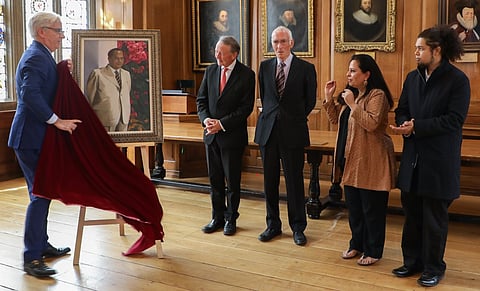

THE Honourable Society of Gray's Inn ("Gray's Inn"), one of the four Inns of Court which admits Barristers to the Bar of England and Wales, has honoured Dr. B.R. Ambedkar ("Dr. Ambedkar") by establishing the "Ambedkar Room" and placing his colourful portrait among the galaxy of portraits of jurists.
The portrait was donated to the Inn by the Federation of Ambedkarite and Buddhist Organisations UK. Master and Treasurer of Gray's Inn Ali Malik, QC, who unveiled the portrait recently said:
"We proudly celebrate the connection Dr. B. R. Ambedkar had to Gray's Inn. He could not have known that over half a century after his passing, his portraits would grace his Inn, that the Walks would boast a tree dedicated in his name, and people would gather to dedicate a room to his memory. Even for a man of his talents, that may have seemed too much – but one does not shape a nation in the way he did without the capacity to dream. Dr. Ambedkar was an agent for change. From today, he will be woven much deeper into the fabric of his Inn, reminding us that no challenge is insurmountable and that the law can be a vehicle for social evolution that may previously have been considered impossible."
Ambedkar Room refurbished recently, is situated at 10 South Square and is expected to be "used for educational training". The room is a fitting tribute to the long association that the Gray's Inn shares with India. Several Indian lawyers, judges, and public figures have been called to the Bar from the Gray's Inn. The noted revolutionary turned Hindutva ideologue, Mr. Vinayak Savarkar was also called to the Bar from the Gray's Inn.
Dr. Ambedkar's tryst with the law started from the Gray's Inn. He was called to the Bar and published in October 1916 as a Barrister, by the Gray's Inn. On donning the Barrister tag, Dr. Ambedkar returned to India and started practicing before the Bombay High Court. As a Barrister armed with legal scholarship, he soon started espousing the cause of the depressed classes by demanding legal and constitutional protections. His articulation of historic discrimination and undignified treatment by the elites of the Hindu society, found its echo in the British Government and as well as in the Indian freedom movement. Post the Independence, when the Constituent Assembly was tasked with the framing of the Constitution of India, Dr. Ambedkar emerged as a natural choice to head the Drafting Committee. He became the architect of the Constitution and it's moral foundation. His seminal contribution in designing the legal framework of India has found its recognition worldwide.
Unfortunately, the Inns of Court are the forgotten stables of legal training for Indians. During pre-independent days, annually about 50 Indians' were called to the Bar as Barristers, who subsequently occupied commanding positions in all the three limbs of independent India (Legislative, Executive, and Administrative). Father of our nation, Mr. Mohandas Gandhi, the first Prime Minister, Mr. Jawaharlal. Nehru, and the Iron-Man of India, Mr. Vallabhbhai Patel, were all Barristers.
However, in the last couple of decades, Indians' choice of pursuing to become a Barrister, has dwindled drastically. This is due to a culmination of many factors such as the high cost of pursuing the course, the time factor, opportunity cost, and low awareness.
Since the political and legal heritage of India is connected to the Inns of Court, why can't the Bar Council of India and the Government of India establish scholarship and awareness programmes to bridge the relationship?
(Anurag M. Katarki is a Barrister at law (Gray's Inn, London) and an Advocate based in Mumbai. Views expressed are personal.)